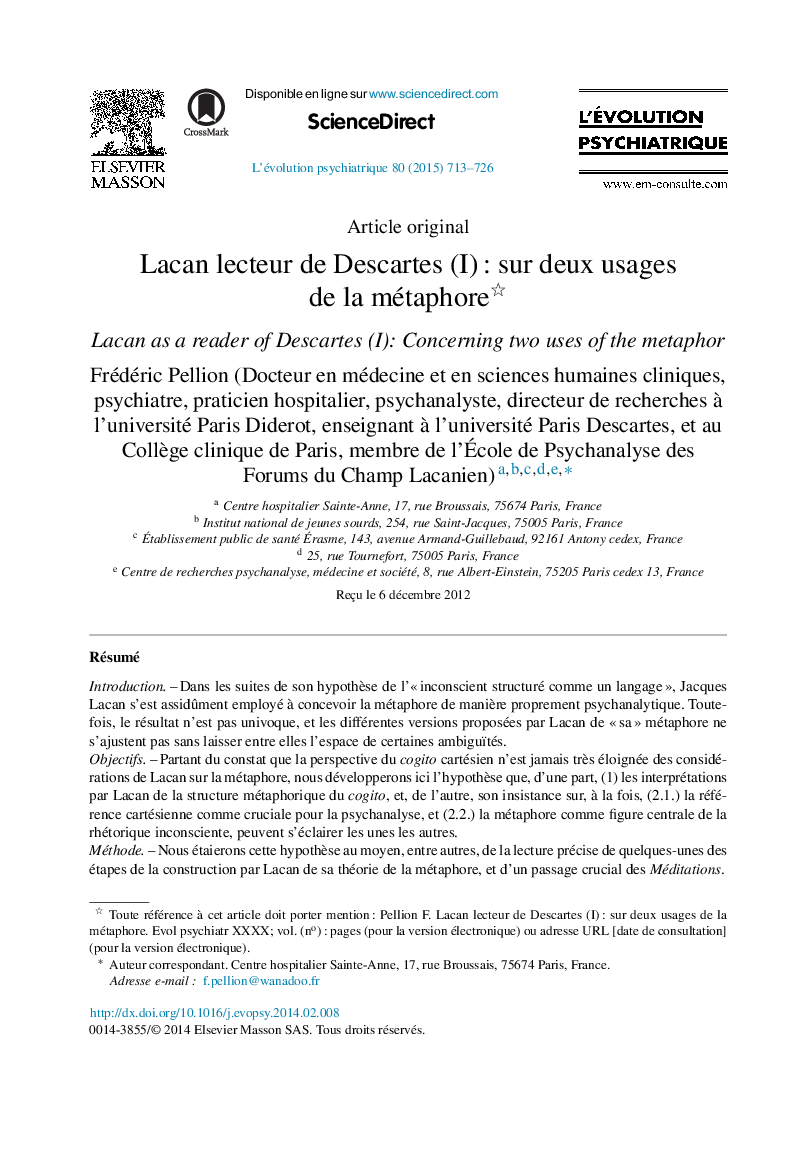| کد مقاله | کد نشریه | سال انتشار | مقاله انگلیسی | نسخه تمام متن |
|---|---|---|---|---|
| 908442 | 1473013 | 2015 | 14 صفحه PDF | دانلود رایگان |

RésuméIntroductionDans les suites de son hypothèse de l’« inconscient structuré comme un langage », Jacques Lacan s’est assidûment employé à concevoir la métaphore de manière proprement psychanalytique. Toutefois, le résultat n’est pas univoque, et les différentes versions proposées par Lacan de « sa » métaphore ne s’ajustent pas sans laisser entre elles l’espace de certaines ambiguïtés.ObjectifsPartant du constat que la perspective du cogito cartésien n’est jamais très éloignée des considérations de Lacan sur la métaphore, nous développerons ici l’hypothèse que, d’une part, (1) les interprétations par Lacan de la structure métaphorique du cogito, et, de l’autre, son insistance sur, à la fois, (2.1.) la référence cartésienne comme cruciale pour la psychanalyse, et (2.2.) la métaphore comme figure centrale de la rhétorique inconsciente, peuvent s’éclairer les unes les autres.MéthodeNous étaierons cette hypothèse au moyen, entre autres, de la lecture précise de quelques-unes des étapes de la construction par Lacan de sa théorie de la métaphore, et d’un passage crucial des Méditations.RésultatsCela nous permettra de préciser comment les enjeux de la métaphore se croisent, mais aussi se distinguent, pour Descartes et pour Lacan, et d’en déduire un éclairage sur quelques-uns des motifs de l’insistance, chez Lacan, de la référence à Descartes en général, et à son cogito en particulier.DiscussionL’horizon du texte demeure en effet celui des rapports à la fois contradictoires et complémentaires du sujet de l’inconscient au « sujet de la science » trouvant dans le cogito cartésien, selon Lacan, son point d’origine.
IntroductionIn the follow-up of his hypothesis of “the subconscious structured as a language”, Jacques Lacan unremittingly devoted himself to conceiving the metaphor in a specifically psychanalytical manner. However, the result is not univocal, and the varying versions proposed by Lacan of “his” metaphor do not adjust themselves without leaving room between them for certain ambiguities.ObjectivesBased on the acknowledgement that the perspective of the Cartesian cogito is never far from Lacan's considerations on the metaphor, we will develop herein the hypothesis whereby on the one hand (1) the interpretations by Lacan of the metaphorical structure of cogito, and on the other, his insistence that both (2.1.) the Cartesian reference as crucial for psychoanalysis and (2.2) the metaphor as a central figure of the subconscious rhetoric, can enlighten each other.MethodWe will develop this hypothesis using, among others, the precise reading of a few of the stages in the construction by Lacan of his theory of the metaphor, and of an essential passage from “Méditations”.ResultsThis will allow us to specify how the stakes of the metaphor overlap, but also distinguish themselves, for Descartes and for Lacan, and result in a clarification of some of the reasons of Lacan's insistence and the reference to Descartes in general, and to his cogito in particular.DiscussionThe horizon of the text indeed remains that of reports, at the same time contradictory and complementary, on the subject of the subconscious regarding “the subject of science” revealing in the Cartesian cogito, according to Lacan, its point of origin.
Journal: L'Évolution Psychiatrique - Volume 80, Issue 4, October–December 2015, Pages 713–726